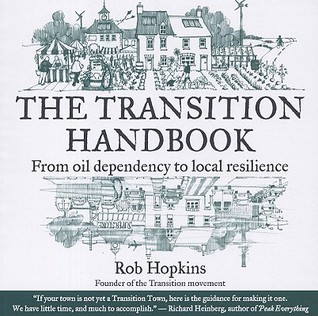
The Transition Handbook(From oil dependency to local resilience)
by Rob Hopkins
We all know that our planet's ecology, upon which our whole civilisation is built, is in mortal danger. We also know that oil, perhaps the most vital resource for that civilisation, will soon run out. What to do?
First, we must find out the real nature of these intertwining dangers in all its horrifying detail, and then we may be in a position to decide what action to take. I can think of no better guide to these two questions than the author (an authority on permaculture and natural building) and the book he has written. It may change your whole attitude to life and the world we live in.
The book starts by outlining the two problems. It gives an almost endless list of all those things in whose production the use of oil has been directly or indirectly involved. It includes not just the latest sophisticated electronic equipment but scores of items in daily use, and without which our modern lives would be unthinkable.
In 30 to 40 years or probably much sooner, THERE WILL BE NO OIL! It's as simple as that. Even our Foreign Secretary has said: "The time is right to think about what it would mean to create a post-oil economy". The author claims:that "Life will radically change, whether we want it to or not". There is abundant evidence that should convince the most obdurate doubters that, first discovery and then production, will cease. But government and the oil companies want "business as usual".
Secondly, there is the well-exposed problem of climate change and many examples are given of the certain effects of this. The author warns that the inundation of areas of current human activity.and the disappearance of many islands will be one result. Then there's the danger of temperature change that could cause devastation.. He suggests that some of these changes may even be beneficial at first, until they reach a critical point leading to destruction.
Can all this be avoided? Not if we continue as we are; current measures are far too little. But YES, if we act now. Three possible courses of action are posited: do nothing, leading to utter destruction; find or invent technical "fixes" - but such "miracles" are unlikely, chancey or will never effect the necessary transformation. The third scenario, the Transition Movementâ's choice, is to change our mindset leading to changes in behaviour
It means gradual adaptation to a simpler lifestyle. The book gives examples of previous pre-oil societies, listing their negative and positive aspects. The "dig for victory" campaign and other measures, willingly accepted during the war, are also cited. Ah, you will say, but that was a national emergency. Quite! It's a question of convincing people of the immediacy of the danger.
Of course, you can't change people's mindset overnight but there are already encouraging signs that some of us have been taking action. The example of Transition Towns is given and they are growing in number. Brighton has recently become one of these, although the author didn'€ know it at the time.The book explains how this movement was started and how it can be developed, quoting chapter and verse of actually existing practices. It brings a positive message of hope
